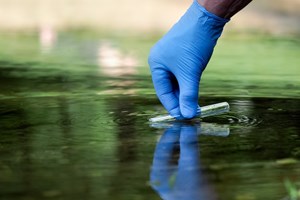Wisconsin lawmakers to vote on spending bill to address PFAS water contamination
MADISON, Wis. (AP) — Wisconsin Republicans moved closer Wednesday to a Senate floor vote on a bill that would spend tens of millions of dollars to address pollution from PFAS chemicals.
The Senate’s natural resources committee approved the legislation on a 3-2 vote Wednesday, clearing the way for a full vote in the chamber. Senate approval would send the bill to the Assembly, where passage would then send the bill to Democratic Gov. Tony Evers for consideration.
Republican lawmakers created a $125 million trust fund for dealing with PFAS in the state budget. A group of GOP legislators from northeastern Wisconsin introduced a bill in June that would create avenues for spending it.
The measure would create a grant program to help municipalities and landowners test for PFAS in their water treatment plants and wells. The state Department of Natural Resources would be barred from delaying development projects based on PFAS contamination unless the pollution is so intense that it endangers the public’s health or could further degrade the environment.
The DNR also would need permission from landowners to test their water for PFAS and would be responsible for remediation at any contaminated site where the responsible party is unknown or can’t pay for the work.
Critics blasted the bill as an attack on the DNR’s authority. The bill’s authors, Sens. Robert Cowles and Eric Wimberger and Reps. Jeff Mursau and Rob Swearingen, spent the summer revising the measure.
The version of the bill they presented to the Senate natural resources committee Wednesday retains the grant program but makes landfills eligible for testing funding as well. It retains the restrictions on the DNR and goes further, blocking the agency from taking any enforcement action against a landowner for PFAS contamination if the landowner allows the department to remediate the property at the state’s expense.
Wimberger said before the committee vote that the restrictions are designed to alleviate landowners’ fears that the DNR will punish them if PFAS are discovered on their property even if the landowners aren’t responsible for them.
“We can’t ever get a grip on this problem if people are terrified their property will be subject to remediation orders,” Wimberger said. “The goal is not to punish people. The goal is to solve the problem.”
Evers’ administration controls the DNR and Democrats on the committee called the restrictions on the agency a deal-breaker.
“There are many good parts of this bill supporting municipalities and well owners,” Sen. Diane Hesselbein said. “(But) I can’t support it because it limits the authority of DNR to combat PFAS.”
PFAS, or per- and polyfluoroalkyl substances, are man-made chemicals that don’t break down easily in nature. They’re present in a range of products, including cookware, firefighting foam and stain-resistant clothing. They have been linked to low birth weight, cancer and liver disease, and have been shown to reduce vaccines’ effectiveness.
Municipalities across Wisconsin are struggling with PFAS contamination in groundwater, including Marinette, Madison, Wausau and the town of Campbell on French Island. The waters of Green Bay are also contaminated.
Republicans have already passed bills limiting the use of firefighting foam that contains PFAS but have resisted doing more amid concerns that clean-up, filtration upgrades and well reconstruction would cost tens of millions of dollars.
The state Department of Natural Resources last year adopted limits on PFAS in surface and drinking water and is currently working on limits in groundwater.
Related News
From Archive

- Glenfarne Alaska LNG targets late-2026 construction start for 807-mile pipeline project
- U.S. water reuse boom to fuel $47 billion in infrastructure spending through 2035
- $2.3 billion approved to construct 236-mile Texas-to-Gulf gas pipeline
- Major water pipe break in Puerto Rico hits over 165,000 customers
- Potomac River Tunnel project enters construction phase beneath Washington, D.C.
- Pennsylvania American Water launches interactive map to identify, replace lead water service lines
- Trump's tariffs drive $33 million cost increase for Cincinnati sewer project
- Utah city launches historic $70 million tunnel project using box jacking under active rail line
- Tulsa residents warned after sewer lines damaged by boring work
- Fatal trench collapse halts sewer construction in Massachusetts; two workers hospitalized




Comments